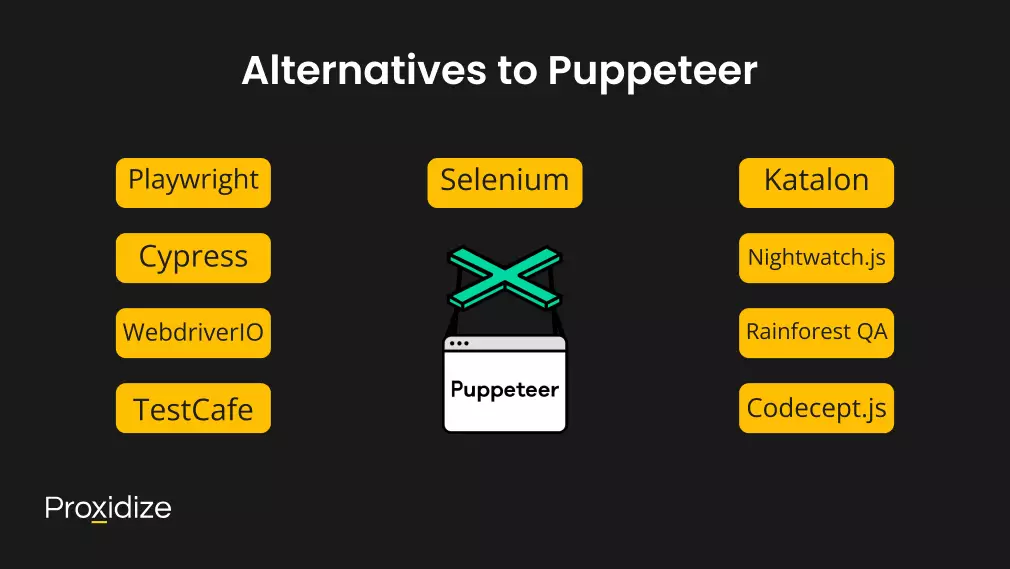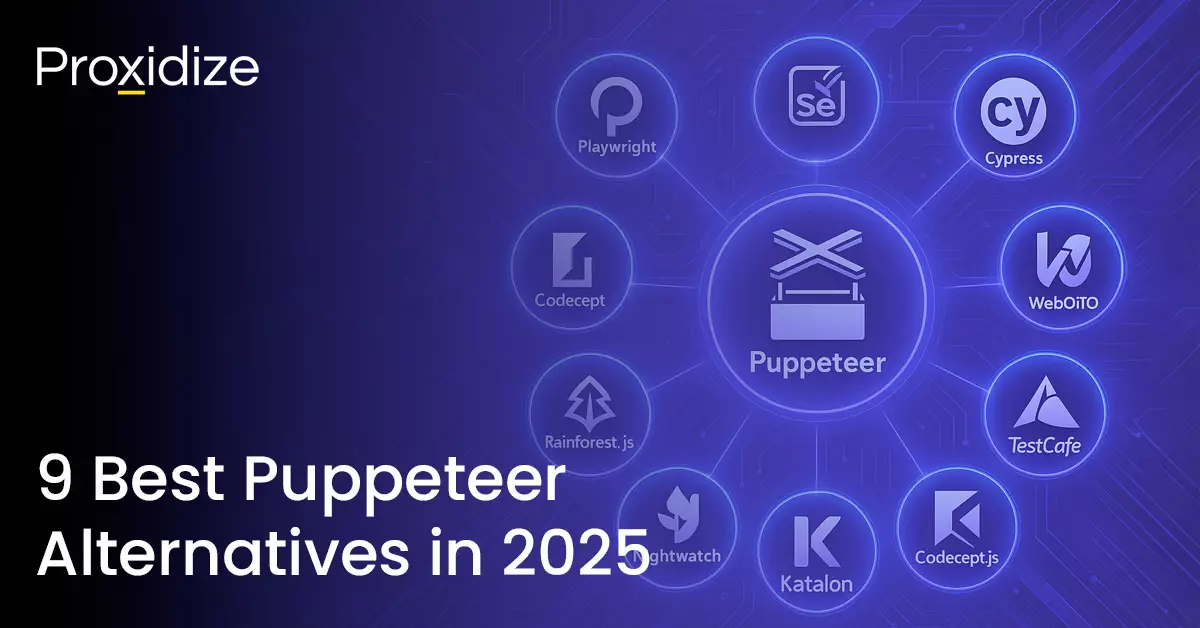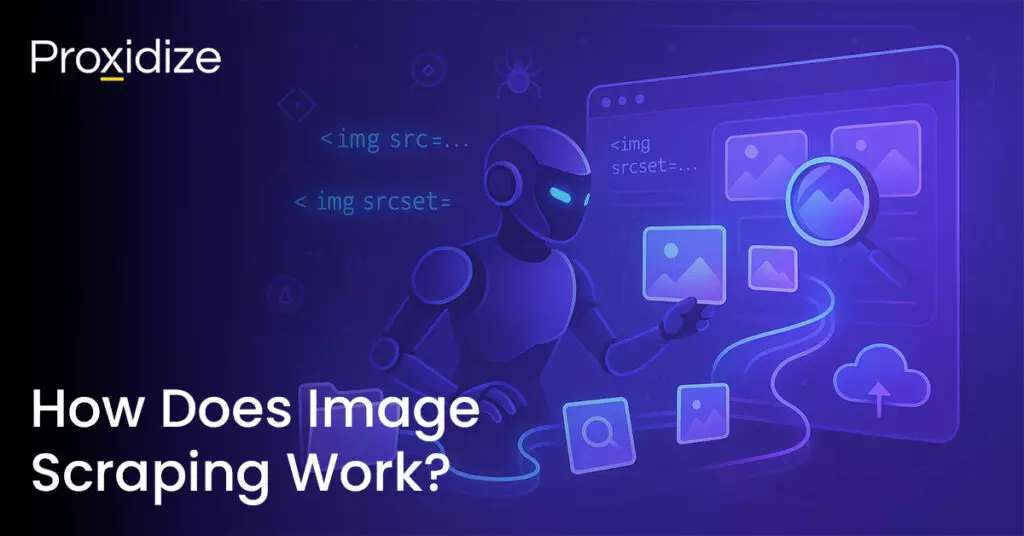Puppeteer’s Chrome-only automation creates significant limitations for comprehensive testing needs. While Puppeteer is great when it comes to browser automation and web scraping, its limited browser support can be a major roadblock for testing needs. Luckily, there are Puppeteer alternatives that are capable of assisting with that. Despite being a great headless browser automation tool, Puppeteer restricts users to Chrome and Chromium-based browsers. This limitation becomes a challenge when you need to ensure your automated tests work across different browser environments. A comprehensive testing process requires a tool that supports a wide range of browsers and automation frameworks, ensuring seamless automation across different environments.
From Microsoft’s Playwright to Selenium, there are several options available for Puppeteer alternatives. We will examine 9 alternatives that provide broader browser compatibility and enhanced testing capabilities for 2025. Through detailed feature comparisons and analysis of why it is a great alternative, you will discover which tool aligns best with your specific automation requirements.

What is Puppeteer?
Developed by Google’s Chrome DevTools team, Puppeteer has emerged as a powerful browser automation framework that provides you with programmatic control over Chrome or Firefox through a high-level API. This open-source Node library helps you automate various browser tasks with precision and efficiency. Puppeteer’s adoption has shown significant growth with usage increasing from 27% in 2019 to 37% in 2021. This uptick in adoption demonstrates its increasing relevance in the automation landscape.
You can use Puppeteer’s capabilities through both headless and headful modes. In headless mode, the browser operates without a graphical interface, making it ideal for server environments and automated testing. This allows for screenshotting and PDF generation of web pages, automated form submission and UI testing, network traffic monitoring and request interception, performance analysis and debugging, web scraping and data extraction, and single-page app testing.
The framework’s architecture is built on two primary protocols including Chrome DevTools Protocol (CDP) which is the default protocol for Chrome automation and WebDriver BiDi which is used for Firefox automation and offers cross-browser compatibility. Puppeteer is able to handle complex scenarios well including dynamic content rendering, network request manipulation, browser context management, event-driven automation, web scraping, cross-origin navigation, and resource monitoring. Puppeteer’s reliance on Chromium browsers means that teams requiring cross-browser automation may need to look for additional features in other tools.

Alternatives to Puppeteer
Exploring the landscape of browser automation tools reveals many Puppeteer alternatives that enhance your testing and automation capabilities. Here are ten of the top Puppeteer alternatives that offer better browser compatibility and enhanced features.
Playwright
Microsoft’s Playwright stands out as an open-source automation library that addresses many of Puppeteer’s limitations. It offers comprehensive cross-browser support through a single API and excels in cross-language capabilities, a built-in auto-waiting function, network interception, and request mocking as well as powerful selectors and shadow DOM support. Playwright has become a popular choice for developers seeking a powerful browser automation tool that excels in cross-browser testing and supports a broader range of environments.
Why Playwright is a Puppeteer Alternative
Playwright was created by the same team that developed Puppeteer. It builds upon Puppeteer’s foundation but extends its capabilities significantly. While Puppeteer sets its focus on Chrome and Chromium, Playwright offers a single API for automating multiple browser engines including Chromium, Firefox, and WebKit.
When assessing it as a Puppeteer alternative, here are a few things to keep in mind. Playwright supports multiple browsers out of the box while Puppeteer needs some additional setup to work with Firefox. Playwright’s API is more modern and intuitive with built-in auto-waiting and better dynamic web content handling. It also outperforms Puppeteer in speed when it comes to complex scenarios. While Puppeteer is JavaScript-centric, Playwright offers official bindings for multiple programming languages.
Selenium
Selenium is an open-source automation framework that offers support for multiple programming languages, cross-browser compatibility across all major browsers, robust integration with CI/CD pipelines, and a comprehensive testing infrastructure along with an extensive ecosystem of tools and plugins.
Why Selenium is a Puppeteer Alternative
Selenium has long been an industry standard for browser automation long before Puppeteer was made. It offers a more mature ecosystem and broader language support, making it a go-to choice for teams with diverse technology backgrounds. When it comes to its advantages as one of the Puppeteer alternatives, Selenium’s support of a wider range of programming languages and its cross-browser compatibility give it the upper hand over Puppeteer.
Cypress
Modern web applications need modern testing solutions and Cypress delivers with its innovative approach. This front-end testing tool has gained rapid adoption with a record 4 million weekly npm downloads. Its key features include real-time reloads, automatic waiting, time-travel debugging, and network traffic control.
Why Cypress is a Puppeteer Alternative
Cypress takes a fundamentally different approach to browser automation when compared to Puppeteer. While Puppeteer operates from outside the browser, Cypress runs directly in the browser which offers unique advantages in terms of speed and debugging. Cypress can also be faster than Puppeteer due to the in-browser execution and it has a gentler learning curve for front-end developers who are already familiar with JavaScript.
WebdriverIO
WebdriverIO has become a versatile testing utility that supports both WebDriver Protocol and Chrome DevTools. It offers cross-browser and mobile testing, parallel test execution, a built-in test runner, and comprehensive documentation.
Why WebdriverIO is a Puppeteer Alternative
WebdriverIO offers a more flexible approach to browser automation because of its support of WebDriver and DevTools protocols. This makes it a great choice for teams looking to consolidate their testing tools. Additionally, WebDriverIO has a larger ecosystem of plugins and integrations when compared to Puppeteer.
TestCafe
TestCafe updates the browser automation game by eliminating the need for WebDriver or other testing dependencies. It offers no additional setup requirements, cross-browser support, concurrent test execution, and built-in waiting mechanisms as well as live mode for test debugging.
Why TestCafe is a Puppeteer Alternative
TestCafe runs tests directly in the browser without the need for external drivers or complex setups. This makes it a great choice for teams looking for a simpler and more streamlined testing solution. Its built-in waiting mechanisms and automatic timeout handling result in more stable tests when compared to Puppeteer. It is also designed to be more intuitive for testers which offers a gentler learning curve than Puppeteer.
Katalon
Katalon offers an all-in-one solution for web, API, and mobile testing. It offers record and playback functionality, cross-browser testing, integration with popular CI/CD tools, and advanced reporting features.
Why Katalon is a Puppeteer Alternative
Katalon offers a more comprehensive testing solution when compared to Puppeteer as Puppeteer focuses on browser automation while Katalon offers a full testing ecosystem that covers web, mobile, and API testing. Its record and playback feature and built-in keywords make it more accessible for non-programmers which is a bonus as Puppeteer is more code-centric in its approach. Katalon offers built-in test management features while Puppeteer needs integration with external tools to do this.
Nightwatch.js
Nightwatch.js is an automation framework that uses the W3C WebDriver API and runs on Node.js. It offers end-to-end testing solutions, component testing capabilities, API testing support, and visual regression testing.
Why Nightwatch.js is a Puppeteer Alternative
Nightwatch.js offers a more traditional approach to browser automation than Puppeteer. It uses the WebDriver protocol which allows it to work with a wider range of browsers. Its focus on end-to-end testing and built-in test runner make it a compelling Puppeteer alternative for teams looking for a complete testing solution. Nightwatch.js also offers built-in support for visual regression testing which Puppeteer does not provide natively.
Codecept.js
CodeceptJS introduced a new approach to end-to-end testing with a scenario-driven framework. Its features include support for multiple testing backends, interactive debugging, parallel testing, and data-driven testing. CodeceptJS also offers Behavior-Driven Development (BDD) style syntax and a plugin architecture for easy extensibility.
Why Codecept.js is a Puppeteer Alternative
CodeceptsJS offers a higher-level and more user-friendly approach to browser automation, which is why it is a contender for a Puppeteer alternative. It can work with multiple backends (including Puppeteer itself) and focuses on readable scenario-driven tests for teams looking to improve test maintainability and readability. CodeceptsJS is also easier to learn than Puppeteer because of its more natural language-like syntax and it offers built-in support for organizing tests into scenarios and features.
Rainforest QA
Rainforest QA is a no-code approach to browser automation and testing. It provides AI-driven test maintenance, cross-browser testing capabilities, detailed analytics and reporting, cloud-based execution, a visual editor for test creation, and integration with CI/CD pipelines.
Why Rainforest QA is a Puppeteer Alternative
Rainforest QA takes a different approach to browser automation due to its no-code solution which non-technical team members can use, while Puppeteer requires learning and understanding code. Tests in Rainforest QA are created through visual editors instead of Puppeteer’s code-based test creation. With its AI-driven test maintenance, manual effort is reduced when placed against maintaining Puppeteer scripts. Rainforest QA tests are executed in the cloud while Puppeteer tests run on local or CI/CD environments, making Rainforest QA more portable.
Each of these Puppeteer alternatives offers unique advantages depending on your specific needs. If cross-browser support is crucial for you, Playwright or Selenium might be your best choice. If you need extensive language support, WebdriverIO or Selenium could be more suitable. Some key factors to keep in mind when picking a Puppeteer alternative include:
- Browser compatibility requirements
- Programming language preferences
- Testing infrastructure needs
- Integration requirements
- Team expertise and learning curve
- Budget constraints
- Scalability needs
By carefully evaluating these factors against the strengths of each tool, you can pick the browser automation solution that best fits your project’s requirements and your team’s capabilities.
Conclusion
Choosing the right browser automation tool depends on your specific requirements. Puppeteer is great for Chrome automation but alternatives like Playwright and Selenium provide broader browser compatibility and enhanced testing capabilities. Playwright stands out with its extensive cross-browser support and powerful automation framework, making it an ideal choice for complex testing scenarios.
Selenium’s strong community packing and seamless integration with various testing frameworks place it as a reliable option for experienced developers. Modern testing tools like Cypress and TestCafe eliminate traditional setup struggles while providing robust features for automated testing. These tools shine particularly when handling complex scenarios across different browser engines.
Selecting the right browser automation tool is important for achieving efficient testing, scalability, and cross-browser compatibility. While Puppeteer is a reliable choice for Chromium-based automation, its limitations make it necessary to explore Puppeteer alternatives that offer broader functionality.
Key Takeaways:
- Cross-Browser support is essential. Tools like Playwright and Selenium offer cross-browser automation with support for Chrome, Firefox, and WebKit.
- Advanced features improve testing efficiency. Modern solutions like Cypress, TestCafe, and WebDriverIO come with automation test framework enhancements like parallel test execution, real-time debugging, and seamless automation.
- Ease of setup and integration is critical. Some tools such as Katalon and Rainforest QA focus on a user-friendly interface with built-in commands for automation infrastructure.
- Performance and scalability matter for large-scale automation. WebDriverIO and CodeceptJS outperform Puppeteer when handling complex tasks as they provide faster execution and detailed tracing.
By carefully evaluating the factors of compatibility, features, ease of use, performance, and flexibility, developers and testers can select the most effective tool for browser automation that aligns with their project’s requirements.
Frequently Asked Questions
What are the main advantages of Playwright over Puppeteer?
Playwright offers multi-browser support for Chrome, Firefox, and WebKit through a single API, cross-language capabilities, and built-in auto-waiting functionality. It’s particularly effective for complex testing scenarios across different browser engines.
Is Puppeteer still relevant in 2025?
Yes, Puppeteer remains relevant, especially for Chrome-centric web automation projects. However, alternatives like Playwright have gained popularity for their broader browser compatibility and enhanced features.
How does Selenium compare to newer automation tools?
Selenium boasts extensive community support, cross-browser compatibility, and integration with CI/CD pipelines. Its robust testing infrastructure and support for multiple programming languages make it a reliable choice for experienced developers.
What makes Cypress stand out among Puppeteer alternatives?
Cypress offers real-time reloads, automatic waiting, time-travel debugging, and network traffic control. It’s particularly suited for modern web applications and has gained rapid adoption with millions of weekly downloads.
How do I choose the right Puppeteer alternative for my project?
Consider factors such as required browser support, programming language preferences, testing infrastructure needs, team expertise, and integration requirements. Evaluate multiple options to find the tool that best matches your specific automation needs and development workflow.




